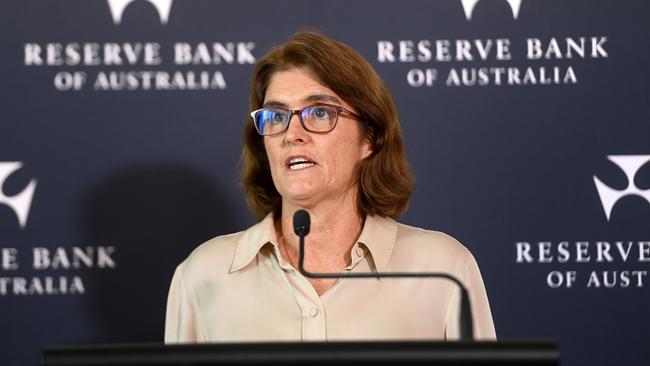Interest rate hikes off the RBA’s agenda, board minutes reveal
The Reserve Bank board did not explicitly consider the case for a rate rise at its March meeting, as new minutes revealed members were feeling more confident that ‘still high’ inflation was tracking lower as expected.

The Reserve Bank board did not explicitly consider the case for a rate rise at its March meeting, cementing the view among economists and investors that the next move in interest rates will be down.
Newly released board minutes revealed that the recent string of economic data had left members feeling more confident that “still high” inflation was tracking lower as expected.
It was the first time board members have not made specific reference to a discussion around whether to increase the cash rate since the RBA began its rapid-fire series of hikes in May 2022.
The RBA board held the cash rate at 4.35 per cent last month, and published records of the two-day meeting revealed diminishing worries that consumer price could come in hotter than anticipated.
Members, however, reiterated that taming inflation “remained the board’s highest priority and that it would take some time before they could have sufficient confidence that this would occur within a reasonable time frame”.
“At the same time, members noted the importance of preserving as many of the gains in the labour market as possible,” the minutes read.
“In light of this and their assessment of the economy, members agreed that it was appropriate to characterise the policy outlook as one in which it was difficult to either rule in or out future changes in the cash rate target.”
Attending an event in Queensland coinciding with the announcement of a $1bn defence export contract with Germany, Jim Chalmers said what the RBA “indicated today is some welcome relief for Australians who are under the pump”.
Six months out from the budget – which Commonwealth Bank economists on Tuesday said could show a surplus in the order of $10bn for this financial year – the Treasurer said “what we’ve seen in our economy is inflation moderating, real wages growing”.
“We’ve had a welcome fall in the unemployment rate a few days ago, and we’ve got a second surplus in sight,” Dr Chalmers said. “But we know that people are still under pressure. And that’s why such a big focus of this government with the tax cuts and our wages policy and our policy for a future made in Australia. We want people to earn more to keep more of what they earn. Creating secure well paid jobs in manufacturing is a big part of that. And it will be a big emphasis in the budget.”
The consensus among economists before the release of the latest minutes was for a first rate cut to come in November, while pricing in financial markets suggested an earlier September move lower.
“Members observed that inflation had continued to moderate over prior months, broadly as expected,” the minutes read.
“That said, services inflation remained high and the recent slowing in the pace of monthly inflation had been influenced by several temporary factors.”
Board members also “observed that the path of disinflation in other countries had not been smooth, which could hold lessons for Australia”.
CBA head of Australian economics Gareth Aird described the minutes as “the most dovish piece of communication from the board since the RBA commenced its tightening cycle in May 2022”.
“The board behind closed doors will view the likely next move in the cash rate as down,” but that it was “too early for the board to shift to an easing bias”, Mr Aird said.
Mr Aird is one of the more optimistic analysts about the prospect for rates relief, predicting a string of three rate cuts over the final three RBA meetings of 2024, starting in September, followed by three more cuts in the first half of next year.
The minutes pre-date official data that showed a booming month for jobs growth coming out of summer that pushed unemployment back down to 3.7 per cent in February and pushed back expectations for rates relief.
Other figures showed annual inflation was 3.4 per cent in the year to February – for the third consecutive month – against the December quarterly figure of 4.1 per cent.
Following a speech in Sydney earlier on Tuesday morning, RBA assistant governor Chris Kent said “inflation has come down” but that the outlook remained highly uncertain. “It’s moderating. That’s a good thing. It’s still high. So there’s more work to be done,” he said. “We’ve had quite a sharp decline in inflation, which is welcome, but then the rest of the distance to get to 2½ (per cent) will take some time.”






To join the conversation, please log in. Don't have an account? Register
Join the conversation, you are commenting as Logout